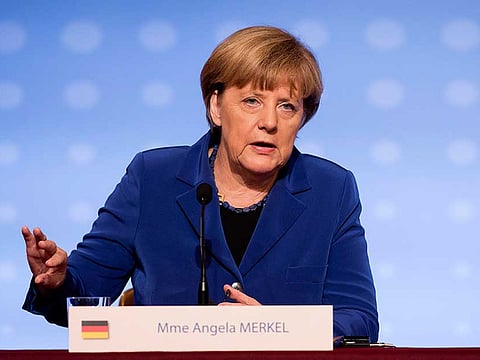Do not blame Merkel for the refugees
Fixing the euro or gaining control of asylum seekers needs the grasp of enlightened self-interest, but with the EU, its political dynamic has gone into reverse

It is all the fault of Angela Merkel. Had the German Chancellor not held out a hand of welcome, the refugee tide would have turned. Syrians would have stopped in their tracks on the road from Damascus. Iraqis, Afghans, Eritreans and the rest would have straightened their shoulders and faced up with equanimity to penury and death at home. Obvious, really.
Europe’s response to the refugee crisis has been displacement activity — an unedifying game of hide and seek with, save for one or two, politicians doing most of the hiding. The hundreds of thousands of Syrians fleeing barrel bombs and beheading did not need Merkel’s permission to climb into boats promising a new life. Nor will they be deterred on their long march by the razor-wire fences in one, nasty corner of the continent.
The forces driving the biggest movement of people Europe has seen since the 1940s are heedless also of the recriminations ricocheting between European capitals. The bitter argument about how to “share out” 120,000 asylum seekers seems almost perverse when there are a million following close behind.
This year has seen the merging of three distinct streams of migration. Tens of thousands from Africa’s trouble spots have been making their way across the Mediterranean over some years. They were joined in 2014 by large numbers from the western Balkans who have given up waiting to be invited to join the European Union (EU). No one should be surprised that Syrians and Iraqis driven out by war should have now decided they had invested enough in the vain hope of one day returning home.
A year ago, it might have been accurate to say that, overall, so-called economic migrants were in the majority. Now the balance has tilted towards refugees. The scale of the challenge is immense. Numbers may fall during the winter — a function of the weather in the Aegean and Mediterranean seas — but no one should imagine that this summer’s influx was a cyclical event. Order has all but broken down across a large swath of the Middle East and Maghreb. The Horn of Africa is riven by conflict. Extremists threaten the safety of parts of west Africa. Escape to Europe seems the only option.
Populists of the xenophobic right have seized the opportunity. Years of economic hardship have offered them fertile ground. No one can be surprised at their appeal to Europeans fearful for their living standards and jobs. However well the migrant inflow is handled, stresses and dislocation are unavoidable. To take a liberal view of Europe’s obligations to refugees (and, incidentally, of its long-term need for migrant workers) should not be to be blind to the disruption of movements on such a scale. That said, it is clearer still that the angry “us and them” politics of the ethnic nationalists does not have any answers. You cannot build a wall around Europe.
The infuriating thing about the EU’s stumbling response this summer is that everyone knows how the influx could be better handled. In the short term, the imperative must be to spread the burden and — this is vital — to ensure the task of settling newcomers is not left to individual cities and municipalities. Governments must bend their fiscal rules to make integration work — or be ready to pay the price in rising populism.
Nor is there is any magic about what to do next. Donald Tusk, president of the European Council, has provided a useful list: Re-establishing control over Europe’s external borders; establishing joint reception centres to identify genuine refugees; funding camps in Turkey, Lebanon and Jordan; and, yes, adding Europe’s economic and political weight to stalled peacemaking efforts from Syria to Somalia to Libya. The €1 billion (Dh4.14 billion) so far allocated to the task should be seen as but a small down payment.
What unites these measures is the imperative of collaboration. Nationalist rhetoric cannot deliver national solutions. Cooperation is what the EU is for. The founding insight was that states can best achieve their national goals by pooling sovereignty. From time to time this has been dressed up in the vaulting language of European civilisation, values and solidarity. The essential motor of the enterprise, however, has always been the pursuit of national interests.
At the start, the guiding purpose was the avoidance of war — shutting down the possibility of a third continent-wide conflagration while building a bulwark against Soviet communism. More recently, the drivers were shared prosperity and, after the fall of the Berlin Wall, the export of stability and democracy to formerly communist states.
The logic of co-operation is as compelling as it has ever been. Fixing the euro or gaining control of migration require the same grasp of enlightened self-interest. The EU’s big problem is that the political dynamic has gone into reverse. Electorates willing to share national power during the good times have been driven to try to reclaim it during the bad. When national governments are seen to fail, this cycle takes another turn for the worse.
There will be nothing easy about breaking the cycle. Europe’s political elites have lost the trust of their citizens. At moments of severe stress, the simple solutions of the populists can seem as beguiling as they are fraudulent. This is why the EU was invented. Today’s leaders have painfully short memories.
— Financial Times


